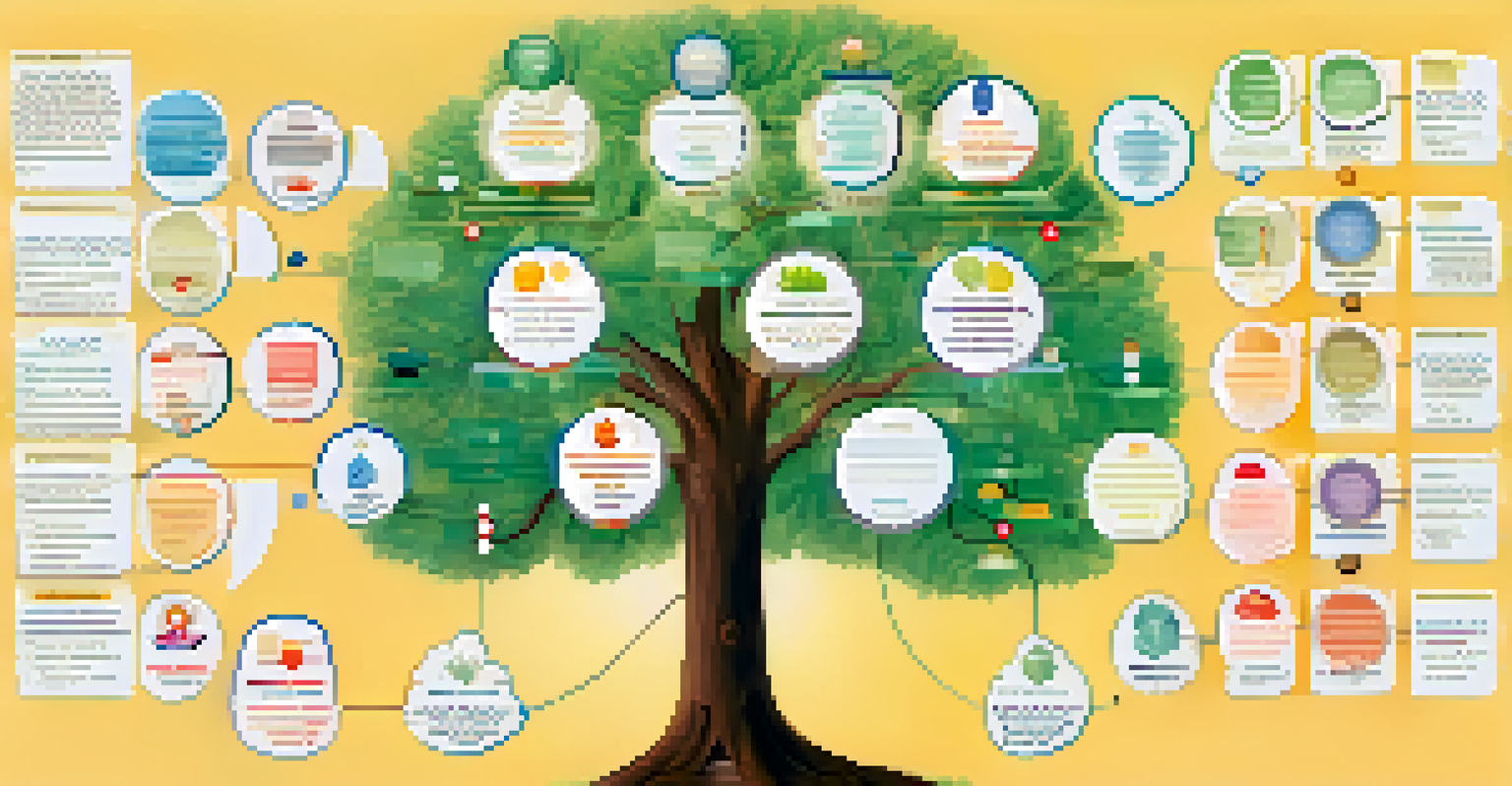Empowering Individuals Through Family Health History Education

Understanding Family Health History: A Key to Wellness
Family health history is like a roadmap to our genetic makeup. It offers valuable insights into potential health risks that run in families, allowing individuals to take proactive steps. By mapping out major illnesses, conditions, and health trends, one can better understand their own health landscape.
Knowing your family history is an important part of understanding your health.
When you gather this information, it becomes a powerful tool in your hands. Imagine being able to predict and prepare for health issues before they arise. This knowledge can motivate individuals to adopt healthier lifestyles and seek preventive care, ultimately leading to better health outcomes.
Furthermore, understanding family health history encourages open conversations about health within families. These discussions can unravel patterns that may not be obvious at first glance, fostering a culture of awareness and support that benefits everyone involved.
The Importance of Sharing Family Health History
Sharing family health history is crucial not only for individual awareness but also for collective wellbeing. When family members share their health experiences, they create a comprehensive picture that can highlight potential genetic risks. This community approach can significantly enhance the effectiveness of preventative measures.

Moreover, by discussing health history openly, families can break down the stigma surrounding certain conditions. This openness can empower individuals to seek help and support, knowing they are not alone. It can also encourage younger generations to prioritize their health based on the experiences of their elders.
Family Health History as a Tool
Understanding family health history empowers individuals to predict and prepare for potential health issues.
Additionally, healthcare providers benefit immensely from the information shared by families. A detailed family health history allows medical professionals to tailor screenings and preventive care strategies, ensuring that individuals receive personalized attention that addresses their unique risks.
How to Collect Your Family Health History
Collecting your family health history doesn't have to be daunting; it can be a simple and engaging process. Start by reaching out to family members, perhaps during a family gathering or a casual dinner. Ask them about any significant health issues, conditions, and their experiences, and don’t forget to take notes!
Family health history is a valuable tool for predicting your risk for certain diseases.
You can create a family tree diagram to visually represent the health information you gather. This can help you see relationships between different health conditions and which family members may be at risk. Using online tools or templates can make this process even easier and more interactive.
Once you have compiled this information, consider sharing it with your healthcare provider. They can help you interpret the data and determine what preventive measures might be most beneficial for your health journey.
The Role of Technology in Health History Education
In today's digital age, technology plays a pivotal role in how we educate ourselves about family health history. There are numerous apps and online platforms designed to help individuals collect, manage, and share their family health information efficiently. These tools can simplify the process and make it more engaging.
For instance, some platforms allow you to build a family tree while also checking for genetic health risks associated with certain conditions. This not only saves time but also provides a clearer picture of your family's health landscape. Plus, many of these tools offer reminders for when to update your information or schedule necessary health screenings.
Importance of Sharing Health Info
Openly sharing family health history fosters collective awareness and enhances preventive care strategies.
Moreover, technology facilitates communication among family members. With shared online accounts or group chats, family members can contribute their health information easily, ensuring that everyone stays informed and engaged in their health journey.
Empowering Conversations: Discussing Health with Family
Initiating conversations about health history can be challenging, but it’s essential for empowerment. Approach the topic with curiosity and openness, framing it as a way to support one another. Sharing personal experiences and insights can help ease any discomfort and encourage others to share their stories.
Consider starting these discussions during family gatherings or casual meetups. You might find that others are just as eager to talk about health as you are. By creating a safe space for dialogue, you foster an environment where family members feel comfortable discussing sensitive topics.
Additionally, these conversations can lead to practical outcomes. Families can collectively decide to adopt healthier habits, schedule regular check-ups, or even participate in health-related activities together, strengthening family bonds while prioritizing wellness.
The Impact of Family Health History on Preventive Care
Understanding your family health history can significantly impact your approach to preventive care. By knowing your family's health background, you can have informed discussions with your healthcare provider about screenings and tests that may be necessary for your age and risk factors. This proactive approach can lead to early detection and better management of potential health issues.
For example, if breast cancer runs in the family, a healthcare provider may recommend earlier mammograms or genetic testing. This tailored preventive care can make a significant difference in outcomes, giving individuals the best chance at maintaining their health.
Tech's Role in Health Management
Technology simplifies the collection and sharing of family health histories, making the process more engaging and efficient.
Ultimately, being proactive about your health based on family history empowers you to take control. It transforms you from a passive participant in your health journey to an informed advocate, equipped with the knowledge to make decisions that can enhance your quality of life.
The Future of Family Health History Education
Looking ahead, the future of family health history education seems promising. As awareness grows, more resources and tools will become available, making it easier for individuals to understand and manage their family health histories. Educational campaigns and community programs will likely play a significant role in spreading this vital information.
Moreover, advancements in genetic testing and personalized medicine will further emphasize the importance of family health history. As more people become aware of their genetic predispositions, the conversation around health history will continue to evolve, empowering even more individuals.

In this ever-changing landscape, one thing remains clear: understanding our family health history is a fundamental step towards personal empowerment and better health outcomes. By embracing this knowledge, we can foster healthier families and communities for generations to come.